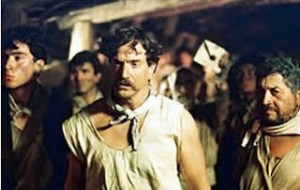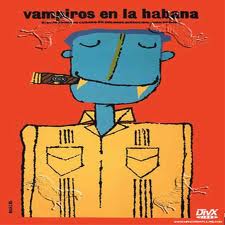Blog del Instituto Cervantes de Dublín
Torre Martello
Conferencia: Irlanda y España en busca de un pasado y presente común: Tendencias actuales de investigación y cooperación | Talk: Ireland and Spain in search of a common past and present. Current trends of research and cooperation
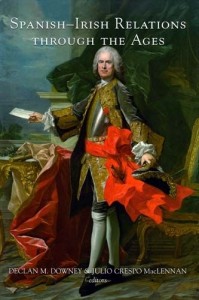 Esta tarde podrás disfrutar de la primera de una serie de conferencias: Diálogos históricos España-Irlanda. El título es Irlanda y España en busca de un pasado y presente común: Tendencias actuales de investigación y cooperación y será impartida por los expertos Declan M. Downey y Julio Crespo Mac Lennan. Te esperamos a las 18:30 en el Café Literario.
Esta tarde podrás disfrutar de la primera de una serie de conferencias: Diálogos históricos España-Irlanda. El título es Irlanda y España en busca de un pasado y presente común: Tendencias actuales de investigación y cooperación y será impartida por los expertos Declan M. Downey y Julio Crespo Mac Lennan. Te esperamos a las 18:30 en el Café Literario.
En los últimos 18 años, ha habido un considerable avance por parte de ciertos académicos y equipos de investigación internacionales e interinstitucionales sobre varios aspectos de las relaciones políticas, diplomáticas, estratégticas, sociales, culturales y económicas entre Irlanda y España/América Latina. Estos avances han generado nuevas perspectivas en la visión histórica global de las sociedades Española e Irlandesa.
Esta singular presentación conjunta entre el Dr. Julio Crespo MacLennan y el Dr. Declan M. Downey indagará en las investigaciones que se están llevando a cabo hoy día por individuos y grupos de colaboración sobre la historia compartida y losretos actuales en las centernarias relaciones entre nuestros países.
Declan M. Downey es Doctorado por la Universidad de Cambridge y desde 1995 es Profesor de Historia de las Relaciones Jurídicas y Diplomáticas de Asia e Historia Moderna de Europa en la University College Dublin. En 2009 se convirtió en el primer irlandés miembro de la Real Academia Española de Historia. Es además miembro del Comité Ejecutivo del Consejo de Estudios de Historia Hispano-irlandesa.
Julio Crespo MacLennan (Madrid, 1970) es licenciado y doctor en Historia por la Universidad de Oxford y ha centrado su trayectoria como historiador y escritor en el análisis de la Europa contemporánea. Es colaborador asiduo de ABC y de otros medios de prensa nacional e internacional. En la actualidad es Director del Instituto Cervantes de Londres.
This evening you can enjoy the first of a series of talks: Irish-Spanish Historical Dialogues. The name is Ireland and Spain in search of a common past and present. Current trends of research and cooperation. The participants are Declan M. Downey and Julio Crespo Mac Lennan. We hope to see you at 6.30 at Café Literario.
Over the past eighteen years, considerable progress has been made by individual scholars as well as international and inter-institutional collaborative research teams into various aspects of the political, diplomatic, strategic, social, cultural and economic relations between Ireland and Spainand the wider Spanish-American World. These developments have opened up new perspectiveson the historical world-view of Spanish and Irish societies.
This special joint-presentation by Dr. Julio Crespo MacLennan (Instituto Cervantes, London) and Dr. Declan M. Downey (University College Dublin) will highlight and explore current scholarship and collaborative research projects into the shared historical experiences and present challengesin the centuries-old relationship between Ireland and Spain.
Declan M. Downey holds the Ph.D. degree from the University of Cambridge and since 1995 he has been lecturing in Modern European and Asian Legal & Diplomatic History at University College Dublin. In 2009, he became the first Irish citizen to be elected to membership of the Spanish Royal Academy of History. He is a member of the Executive Committee of the Council for Spanish-Irish Historical Studies.
Julio Crespo MacLennan (Madrid, 1970) holds a Ph.D. degree in History from the University of Oxford. He has focused his career as historian and writer in the analysis of Contemporary Europe. He is a frequent contributor for ABC and other Spanish and international major newspapers. At present he is Director of Instituto Cervantes London.
Cine | Film Screening: Teresa
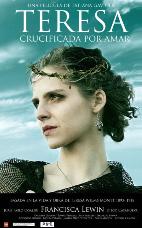 El ciclo de cine chileno continua esta tarde a las 18:00 con la proyección de una nueva película, Teresa, dirigida por Tatiana Gaviola.
El ciclo de cine chileno continua esta tarde a las 18:00 con la proyección de una nueva película, Teresa, dirigida por Tatiana Gaviola.
Teresa Wilms Montt, talentosa, atormentada y bella. Casada a los 17 años, pese a la oposición familiar, al poco tiempo se enamora de quien no debe. El castigo que recibe es el encierro en el convento de la Preciosa Sangre. Separada definitivamente de sus dos hijas se escapa a Buenos Aires con Vicente Huidobro. Desde ese momento su vida se transforma en un apasionante y trágico itinerario.
The new Chilean film series brings you a new film today at 6pm. The film is Teresa by Tatiana Gaviola.
Teresa Wilms Montt is a talented, tormented and beautiful woman. She married at 17 despite family opposition and soon falls for the wrong kind. She is sent to The Convent of the Precious Blood as punishment and is separated from her two daughters. She finally escapes to Buenos Aires with Chilean poet and writer Vicente Huidobro. From that moment on her life becomes an exciting and tragic journey.
Cine | Film Screening: Subterra
Continuamos con el ciclo de cine chileno. Esta tarde se proyecta la película Subterra, del director Marcelo Ferrari. Te esperamos como siempre a las 18:00 en el Café Literario.
Pueblo de Lota, Chile, 1897. En las profundidades de la mina de carbón más grande del mundo, una gran rebelión se gesta en el corazón de un hombre. Mientras la aristocrática familia Cousiño Goyenechea sueña con el advenimiento del “progreso”, los mineros del carbón despiertan en busca de su dignidad. Basada en el libro homónimo de Baldomero Lillo, Subterra, narra una historia de cambios humanos y sociales.
The Chilean Film Series continues this evening with the screening of Subterra by Marcelo Ferrari.We hope to see you at 6pm at Café Literario.
Lota, Chile, 1897. In the depths of the biggest coalmine on earth, a far reaching rebellion is brewing in a man´s heart. While the aristocratic family Cousiño Goyenechea dreams about the arrival of progress, coal miners awake in search of their dignity. The film, based on the book “Subterra” by Baldomero Lillo narrates a story of human and social changes.
Cine | Film Screening: Se arrienda
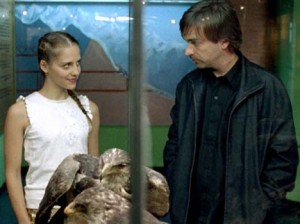 Esta tarde no te puedes perder la primera sesión del III Ciclo de Cine Chileno. Proyectamos la película Se arrienda del director Alberto Fuguet a las 18:00 en el Café Literario.
Esta tarde no te puedes perder la primera sesión del III Ciclo de Cine Chileno. Proyectamos la película Se arrienda del director Alberto Fuguet a las 18:00 en el Café Literario.
Al final de los años 80, el joven músico Gastón Fernández (Luciano Cruz-Coke) tenía por delante un futuro brillante, junto a su grupo de amigos soñadores e idealistas. Quince años después, el destino los ha separado. Gastón regresa a Chile, y se enfrenta a un país distinto y a la frustración del éxito artístico que nunca llegó. Mientras sus amigos disfrutan de la prosperidad, los recuerdos lo atormentan. Obligado por las circunstancias, Gastón deberá transar trabajando en la corredora de propiedades de su padre, iniciando así un viaje donde conocerá a Elisa (Francisca Lewin) y entenderá la vida, sin el peso del pasado.
Después de la proyección tendrá lugar un cóctel inaugural, por cortesía de la Embajada de Chile en Irlanda.
You cannot miss the opening session of the 3rd Chilean Cinema Season. We will screen the film Se arrienda by filmmaker Alberto Fuguet at 6pm at Café Literario.
At the end of the 80’s, the young musician Gastón Fernández (Luciano Cruz-Coke) had a brilliant future ahead with his dreaming and idealist friends. Fifteen years later, destiny separated them. Gaston returns to Chile carrying the frustration of an artistic success that never materialized and finds a changed country. While his friends enjoy a prosperous life, memories haunt him. Life pressures lead Gaston to work in his father´s estate agency. It is in his workplace that he embarks on a journey that will lead him to Elisa (Francisca Lewin) and to an understanding of the meaning of life without the weight of the past.
Followed by a wine reception, compliment of the Embassy of Chile in Ireland.
Concierto: La guitarra española: Un viaje imaginario por España de la mano de la guitarra española de Angel | Concert: La guitarra española: An imaginary trip around Spain guided by Angel’s Spanish Guitar
El guitarrista Angel nos trae un gran repertorio en guitarra clásica española esta tarde a las 20:00 en el Café Literario. Si deseas asistir a este concierto, envía un correo electrónico a reservas.dublin@cervantes.es
Tras años de investigación sobre la música y tradiciones españolas, el desarrollo de una interpretación de música de siempre va tomando forma y el sonido de España emana de las seis cuerdas de un instrumento que describe el alma española. Angel presenta la música de algunos de los grandes compositores españoles como Enrique Granados, Joaquín Malats, Francisco Tárrega, Manuel de Falla e Isaac Albéniz en este concierto dedicado a la guitarra española.
Las representaciones de Angel han tenido gran aceptación en la comunidad artística y público general irlandeses y europeos. Los amantes de la cultura española lo sitúan en un lugar privilegiado por su interpretación personal de la música española. Su técnica embellece su música con la impresionante expresividad de su repertorio y conciencia lírica.
The guitar player Angelwill bring us today a great repertoire of Spanish classical guitar. This great gig will be at 8 pm at Café Literario. If you wish to attend this concert, send an e-mail to: reservas.dublin@cervantes.es
Through many years of research into Spanish music and traditions, the development of an interpretation into old favourites has taken shape little by little and the sounds of Spain flows from the six strings of the instrument that describes the soul of Spain. Angel presents the music of some of the greatest Spanish composers like Enrique Granados, Joaquín Malats, Francisco Tárrega, Manuel de Falla and Isaac Albéniz in
this concert dedicated to La Guitarra Española.
Angel’s performances have had a great impact on general audiences and on the artistic community in Ireland and Europe alike. His interpretations of Spanish music make him a preferred choice for audiences captivated by the Spanish culture. His powerful expressive range and his lyrical awareness are remarkable.
Audiolibro de la semana | Audiobook of the Week: Kafka y la muñeca viajera
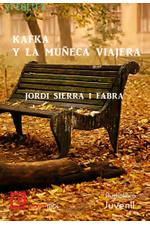 Esta semana os traemos el audiolibro Kafka y la muñeca viajera del versátil y prolífico escritor Jordi Sierra i Fabra. Para descargarte esta conmovedora historia solo hay que seguir dos pasos: coger tu carnet de la biblioteca y pulsar en el enlace.
Esta semana os traemos el audiolibro Kafka y la muñeca viajera del versátil y prolífico escritor Jordi Sierra i Fabra. Para descargarte esta conmovedora historia solo hay que seguir dos pasos: coger tu carnet de la biblioteca y pulsar en el enlace.
Un año antes de su muerte, Franz Kafka vivió una experiencia muy insólita. Paseando por el parque Steglitz, en Berlín, encontró a una niña llorando desconsolada: había perdido su muñeca. Para calmar a la pequeña, el autor de La metamorfosis se inventó una peculiar historia: la muñeca no se había perdido, se había ido de viaje, y él, convertido en cartero de muñecas, tenía una carta que le llevaría al día siguiente al parque. Aquella noche Franz escribió la primera de las muchas cartas que, durante tres semanas, entregó a la niña puntualmente, narrando las peripecias de la extraordinaria muñeca desde todos los rincones del mundo.
Según cuenta Dora Dymant, su compañera en aquellos días, el estado febril con el que Kafka escribía esas cartas era comparable al de cualquiera de sus inmortales obras. Éste es el relato de aquella experiencia, en la que Franz Kafka fue un mago de la palabra para una niña desconocida de la que jamás volvió a saberse nada, como tampoco de aquellas cartas que constituyen uno de los misterios más hermosos de la narrativa del siglo XX.
This week we bring you the audiobook Kafka y la muñeca viajera by the versatile and prolific writer Jordi Sierra i Fabra. To download this touching story you have to follow only two steps: take your library card and click here.
The year before his death, Franz Kafka lived a very unusual experience. He was taking a walk in the Steglitz Park in Berlin where he found a girl crying inconsolably: she had lost her doll. The author of The Metamorphosis made up a peculiar story: the doll wasn´t lost, she went for a travel and he, as a postman for dolls, had a letter that he would bring her to the park the next day. That night he wrote the first of the many letters that he would give to the girl punctually for three weeks, narrating the adventures of this extraordinary doll from all over the world.
According to Dora Dymant, his partner back then, the hectic mood that Kafka experienced while he wrote those letters was comparable to the one he felt when he wrote any of his immortal works. This is the story of that experience in which Franz Kafka was a magician of words for an unknown girl. It remains a mystery what happened to that girl or to those letters that are one of the most beautiful secrets of the 20th century narrative.
Cine | Film Screening: Planes para mañana
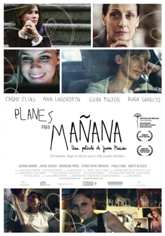 La última sesión del ciclo de cine dedicado a los jóvenes realizadores españoles te la ofrecemos esta tarde a las 18:00 en el Café Literario. Se trata de Planes para mañana de la directora Juana Macías.
La última sesión del ciclo de cine dedicado a los jóvenes realizadores españoles te la ofrecemos esta tarde a las 18:00 en el Café Literario. Se trata de Planes para mañana de la directora Juana Macías.
Cuenta la historia de cuatro mujeres el día en que sus vidas van a cambiar radicalmente. En sus manos, tienen la opción de empezar de nuevo. En su corazón, el vértigo de romper con todo aquello que han ido construyendo durante años.
The last session of the film series dedicated to Spanish new filmmakers will be held today at 6pm at Café Literario. The film is Planes para mañana by director Juana Macías.
It is the story of four women on the day that their lives will change radically. The option to start over is in their hands. The frenzy idea to break with everything that has been building up over the years underlie from the bottom of their hearts.
Cine | Film Screening: Amateurs
La película que te ofrecemos hoy a partir de las 18:00 en el Café Literario es Amateurs del director Gabriel Velázquez.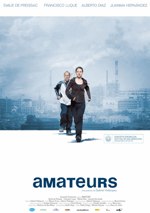 Esta proyección es parte del ciclo de nuevos realizadores españoles donde te mostramos lo mejor del más reciente cine español.
Esta proyección es parte del ciclo de nuevos realizadores españoles donde te mostramos lo mejor del más reciente cine español.
Julio Nieves, un capataz de la construcción de 65 años, que ha vivido toda su vida solo en el madrileño barrio de Vallecas, se enfrenta, solo también, a su próxima jubilación. La vida de Nieves cambiará cuando reciba, como caída del cielo, una hija de 16 años que viene de Marsella, Francia. Pero ¿y si no es su hija? ¿y si Nieves la acoge como remedio a su soledad? ¿Hasta dónde somos capaces de llegar para no estar solos?
The film that we screen today at 6pm at Café Literario is Amateurs by Gabriel Velázquez. This film is part of the Spanish New Filmmakers Series where we show you the best of the most recent Spanish cinema.
Julio Nieves, a 65-year-old foreman in the building industry, has always lived alone in the Madrid district of Vallecas and now he is facing his coming retirement alone. Julio’s life is going to change when he is visited by his 16-year-old daughter from Marseille in France, a godsend for him. But what if she isn’t his daughter? And what if he welcomes her as the solution to his loneliness? What lengths are we prepared to go to so as not to be alone?
Presentación de libro | Book Launch: Forked Tongues. Poetas gallegas, vascas y catalanas traducidas por poetas de Irlanda
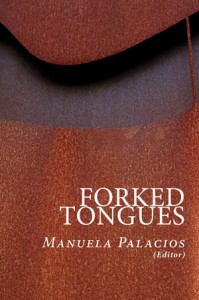 Terminamos el mes con la presentación del libro Forked Tongues, una antología editada por Manuela Palacios de poemas de poetas gallegas, vascas y gallegas traducidas al inglés por poetas irlandesas. Te esperamos hoy a las 18:00 en el Café Literario.
Terminamos el mes con la presentación del libro Forked Tongues, una antología editada por Manuela Palacios de poemas de poetas gallegas, vascas y gallegas traducidas al inglés por poetas irlandesas. Te esperamos hoy a las 18:00 en el Café Literario.
Irlanda ha sido con frecuencia fuente de inspiración para Galicia, el País Vasco y Cataluña bien sea por razones políticas, sociales o culturales. Esta antología lleva a cabo un diálogo intercultural que redefine y fortalece los lazos literarios entre estas comunidades. Poetas de Irlanda recrean en inglés los poemas de una selección de las poetas actuales más destacadas en Galicia, el País Vasco y Cataluña. Juntos enriquecen la escena literaria europea al celebrar su diversidad.
Editada por Manuela Palacios y publicada por Shearsman, la antología Forked Tongues incluye poemas de Pilar Pallarés, Chus Pato, Lupe Gómez Arto, Yolanda Castaño, María do Cebreiro (Galicia); Itxaro Borda, Miren Agur Meabe, Castillo Suárez, Leire Bilbao (País Vasco); Vinyet Panyella, Susanna Rafart, Gemma Gorga, Mireia Calafell (Cataluña).
Traducciones de Maurice Harmon, Lorna Shaughnessy, Anne Le Marquand Hartigan, Máighréad Medbh, Mary O’Donnell, Celia de Fréine, Catherine Phil MacCarthy, Susan Connolly, Paddy Bushe, Michael O’Loughlin, Paula Meehan, Keith Payne, Theo Dorgan, con el asesoramiento de Kirsty Hooper, Diana Cullell y Juan Arana-Cobos.
Se servirá vino español.
February ends with the book lauch of Forked Tongues, an anthology edited by Manuela Palacios. It consists of a selection of poems written by Galician, Basque and Catalan poets translated into English by Irish poets. We hope to see you today at 6pm at Café Literario.
Galicia, the Basque country and Catalonia have often found in Ireland an “inspiring Other” whether for political, social or cultural reasons. This anthology engages in an intercultural dialogue which redefines and strengthens the literary bonds among these communities. A selection of the most prominent Galician, Basque and Catalan contemporary women poets have their verse recreated in English by Irish writers. Together they enrich the European literary scene by celebrating its diversity.
Edited by Manuela Palacios and published by Shearsman, Forked Tongues features work by Pilar Pallarés, Chus Pato, Lupe Gómez Arto, Yolanda Castaño, María do Cebreiro (Galicia); Itxaro Borda, Miren Agur Meabe, Castillo Suárez, Leire Bilbao (Basque Country); Vinyet Panyella, Susanna Rafart, Gemma Gorga, Mireia Calafell (Catalonia).
Translations by: Maurice Harmon, Lorna Shaughnessy, Anne Le Marquand Hartigan, Máighréad Medbh, Mary O’Donnell, Celia de Fréine, Catherine Phil MacCarthy, Susan Connolly, Paddy Bushe, Michael O’Loughlin, Paula Meehan, Keith Payne, Theo Dorgan. Translation drafts by Kirsty Hooper, Diana Cullell and Juan Arana-Cobos.
Spanish wine will be served.
Cine | Film Screening: Yo
Continuamos con el ciclo dedicado a nuevos valores del cine español con la proyección de Yo de Rafael Cortés. La película 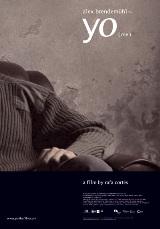
se proyecta hoy a las 18:00 en el Café Literario.
Un pueblo en Mallorca. Un Nuevo trabajador alemán. Una sospecha no verbalizada. Un trabajo que conservar. Yo es la historia de un hombre que, sintiéndose acusado de algo que no ha hecho, trata de demostrar una inocencia que nadie cuestiona. Sus intentos por resolver esta situación le llevaran a confrontarse con el verdadero problema: él mismo.
The film series dedicated to new Spanish filmmakers brings you the film Yo by Rafael Cortés. The film will be screened today at 6pm at Café Literario.
A village in Majorca. A new German worker. An unspoken suspicion. A job to hang on to. Yo is the story of a man who, feeling accused of something he hasn´t done, sets out to prove an innocence nobody questions. Every attempt to correct this mistake leads him closer to the real problem: himself.
Cine | Film Screening: Lo mejor de mí
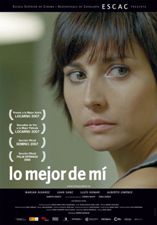 Continuamos con el ciclo de nuevos realizadores españoles. La proyección de hoy es Lo mejor de mí, de la directora Roser Aguilar, una fresca y sensible historia que puedes disfrutar hoy a las seis en nuestro Café Literario.
Continuamos con el ciclo de nuevos realizadores españoles. La proyección de hoy es Lo mejor de mí, de la directora Roser Aguilar, una fresca y sensible historia que puedes disfrutar hoy a las seis en nuestro Café Literario.
Cuando era pequeña, Raquel no podía entender por qué en todas partes se hablaba de amor: en la radio de casa, en la tele, en las películas del sábado por la tarde y, sobre todo, en las canciones. Y pensaba qué pasaría si no encontraba a nadie que la quisiera. Ahora Raquel se va a vivir con Tomás. Deberá plantearse qué está dispuesta a hacer por amor y descubrirá lo bonito y difícil de querer a alguien de verdad.
We keep offering you the best of new Spanish film makers. The film Lo mejor de mí, a fresh and sensitive story by Roser Aguilar will be screened today at 6pm at Café Literario.
When Raquel was a little girl she could not understand why everyone talked constantly about love: on the radio, on TV, in Saturday afternoon films and specially in songs. She always wondered what would happen if she did not find anyone who would love her. When Raquel moves in with Tomas, she will have to ask herself what she could be willing to do for love. She will discover how beautiful, and at the same how difficult, it is to truly love someone.
Audiolibro de la semana | Audiobook of the Week: Citas en Manhattan
El audiolibro de la semana es Citas en Manhattan de Emma Reverter, periodista catalana afincada en Nueva York. Para descargar esta divertida reflexión sobre la dificultad de las relaciones de pareja, haz click aquí.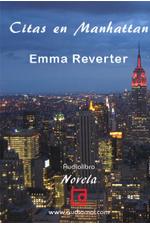
Victoria Sachs es una atractiva e inteligente periodista, especializada en política internacional que vive en Manhattan. Con la llegada del calor recibe el encargo de escribir una columna ligera para el suplemento veraniego de su periódico y, al no ser su especialidad, tiene miedo de fracasar. Victoria investigará y compartirá con los lectores las novedosas posibilidades que ofrece el mercado para encontrar a nuestra media naranja. Citas en Manhattan es una novela ácida, divertida e inteligente sobre el mundo de las citas en Nueva York, una tendencia que se ha convertido en un auténtico fenómeno social.
The audiobook of the week is Citas en Manhattan by Emma Reverter, a Catalan journalist who resides in New York. To download this funny reflection about relationships, click here.
Victoria Sachs is an attractive and intelligent journalist living in Manhattan and specialized in international politics. As summer approaches, she gets the assignment of writing a light column for the summer supplement of her newspaper. It is not her speciality and she´s afraid of failing. Victoria will research and share with the readers the different possibilities offered in the market to find our better half. Citas in Manhattan is a witty, funny and smart novel about the dating world in New York, a trend that has become a social phenomenon.
Autor del mes | Author of the Month: Rafael Gumucio
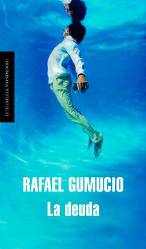
Nuestro autor del mes de febrero es el chileno Rafael Gumucio (Santiago, 15 de enero de 1970) que recientemente nos visitó durante el Festival ISLA.
Es hijo del historiador Rafael Luis Gumucio y nieto del político de izquierda Rafael Agustín Gumucio. Cursó sus estudios en Literatura en la Universidad de Chile y tras el golpe militar de 1973 se vio obligado a exiliarse en Francia donde residió varios años antes de poder regresar a Chile. Posteriormente también vivió en España donde permaneció hasta el 2004.
En 1999 publicó Memorias prematuras un libro donde el escritor narra su vida; el exilio con su familia en Francia, su regreso a Chile, su fracaso con las mujeres, sus inicios en el periodismo y la vida universitaria. Para muchos es lo mejor de su producción.
Es autor entre otras obras de Monstruos cardinales (2002), Comedia nupcial (2002), Páginas coloniales (2006) etc. Destacan especialmente Los platos rotos (2004), un ensayo histórico que une cuento, teatro, novela y narrativa y repasa la historia de Chile y también La deuda (2009), novela inspirada en el caso del contador de las estrellas, un estafador que engañó a artistas y animadores.
Ha escrito para publicaciones tan prestigiosas como La Nación, El Mercurio, La Tercera, El Metropolitano, Las Últimas Noticias, El País, ABC y el New York Times, así como en las revistas Apsi, Rock & Pop, Fibra, de la que fue creador y editor general, The Clinic, de la que también fue uno de sus fundadores.
Ha sido también animador, guionista y realizador de programas de televisión como Gato por liebre (Rock & Pop Televisión, 1995-1998) y del programa de humor absurdo Plan Z, que recibió múltiples censuras.
Es director del Instituto de Estudios Humorístico de la Universidad Diego Portales y humorista-locutor del programa Desde Zero de Radio Zero, junto a Patricio Fernández y Claudia Álamo. En 2004 resultó ganador del Premio Anna Seghers y fue finalista del Premio Altazor en los años 2000 y 2003 con Memorias prematuras y Monstruos cardinales.
Te esperamos en la biblioteca con lo más destacado de la obra de Rafael Gumucio.
The author of the month of February is Chilean writer Rafael Gumucio (Santiago, 15th January 1970) who recently visited us during the ISLA Festival.
He is son of the historian Rafael Luis Gumucio Rivas and grandson of the left-wing politician Rafael Agustín Gumucio. He studied Literature at the University of Chile. After the 1973 Chilean coup d´etat he lived as an exile in France before returning to Chile. He also resided in Spain for several years until 2004.
He published his first novel in 1999, Memorias prematuras (Premature memoirs) a book where the writer narrates his life; the exile with his family in France, his return to Chile, his failure with women, his first dabblings in journalism and university life. This book is considered his best work to date.
He has written among others: Monstruos cardinales (2002), Comedia nupcial (2002), Páginas coloniales (2006) etc. The most relevants are Los platos rotos (2004), an historical essay that has something of short story, theatre, novel and narrative telling the history of Chile and also La deuda (2009) a novel inspired in the case of the “star meter”, a con man who tricked artists and entertainers.
He has written for the newspapers La Nación, El Mercurio, La Tercera, El Metropolitano, Las Últimas Noticias, El País, ABC and New York Times and for the magazines Apsi, Rock & Pop, Fibra, of which he was founder and general editor and The Clinic, of which he was also one of its founders.
He has also been conductor, script-writer and producer of television shows like Gato por liebre (Rock & Pop Televisión, 1995-1998) and of the absurdist humour show Plan Z (TV show), which was censored more than once.
He is director of the Instituto de Estudios Humorísticos of the Universidad Diego Portales and comedian-host of the Desde Zero show on Radio Zero with Patricio Fernández and Claudia Álamo. He won the Anna Seghers Award in 2004 and he was short-listed for the Altazor Award in 2000 and 2003 with Memorias prematuras and Monstruos cardinales.
We hope to see you at the library with a selection of Rafael Gumucio´s work.
Cine | Film screening: Vampiros en la Habana
Nos despedimos del ciclo de cine cubano con la película de animación Vampiros en la Habana. La película empieza a las 18:00 en el Café Literario. ¡Estáis todos invitados!
La divertida trama transcurre en 1933 y grupos dominantes de vampiros europeos y norteamericanos se dan cita en La Habana para hacerse con la fórmula de la mágica poción “Vampisol”, desarrollada por el científico alemán Werner Amadeus von Dracula, que permite a los vampiros exponerse al sol, sin ser afectados por los rayos ultravioleta.
La prueba viviente de la efectividad de la poción, Wolfgang Amadeus von Dracula, Pepito para sus amigos, es un divertido trompetista, que ha sido criado tan normalmente que desconoce por completo su origen vampiresco.
The last session of the Cuban film series will be today at 6pm at Cafe Literario where you can enjoy the animated film Vampiros en la Habana. All of you are invited!
The hilarious story is set in 1933. Dominant European and American vampire groups meet in Havana to get their hands on a fabulous new potion called “Vampisol”, developed by German scientist Werner Amadeus von Dracula, that lets vampires out into the sun without the harmful effects of UV rays.
Living proof of the successful potion is Wolfgang Amadeus von Dracula, Pepito to his friends, a carefree trumpet player, raised so normally that he has no idea he is a vampire.
Cine | Film screening: Kangamba
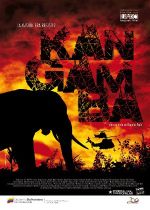 La tercera sesión del ciclo de cine cubano llega de la mano de la película Kangamba. ¡Ven a disfrutarla hoy a las 18:00 horas en el Café Literario!
La tercera sesión del ciclo de cine cubano llega de la mano de la película Kangamba. ¡Ven a disfrutarla hoy a las 18:00 horas en el Café Literario!
África, República Popular de Angola. Agosto de 1983. Miles de efectivos de la UNITA –entrenados y armados por el ejército sudafricano- lanzan una violenta ofensiva contra fuerzas de las FAPLA -leales al gobierno angolano- y un grupo de asesores cubanos, combatientes de las FAR, estacionados en CANGAMBA, pequeño poblado situado al sur del país. Durante más de una semana, se desarrolla una desigual batalla, que también golpea a la inocente población civil.
Este filme intenta reflejar y recrear esta dramática situación, en la cual los combatientes de las FAPLA y de las FAR, tratan de resistir y prevalecer, pero pagando un alto precio: la victoria, a veces, puede tener un amargo sabor.
The third session of the Cuban Film Series comes from the hand of Kangamba. Come to enjoy this film today at 6pm at Café Literario!
Africa, Popular Republic of Angola. August 1983. Thousands UNITA troops –trained and armed by the South African Army- launch a violent offensive against FAPLA forces –loyal to the Angolan government- and a group of Cuban advisers stationed in Cangamba, a small village in the South of the country. For over a week they engage in an unequal battle, which also hits the innocent civilian population. The film tries to present and recreate this dramatic situation, in which the FAPLA and the Cuban combatants try to resist and prevail, but at a very high price. Victory can sometimes have a bitter taste.
